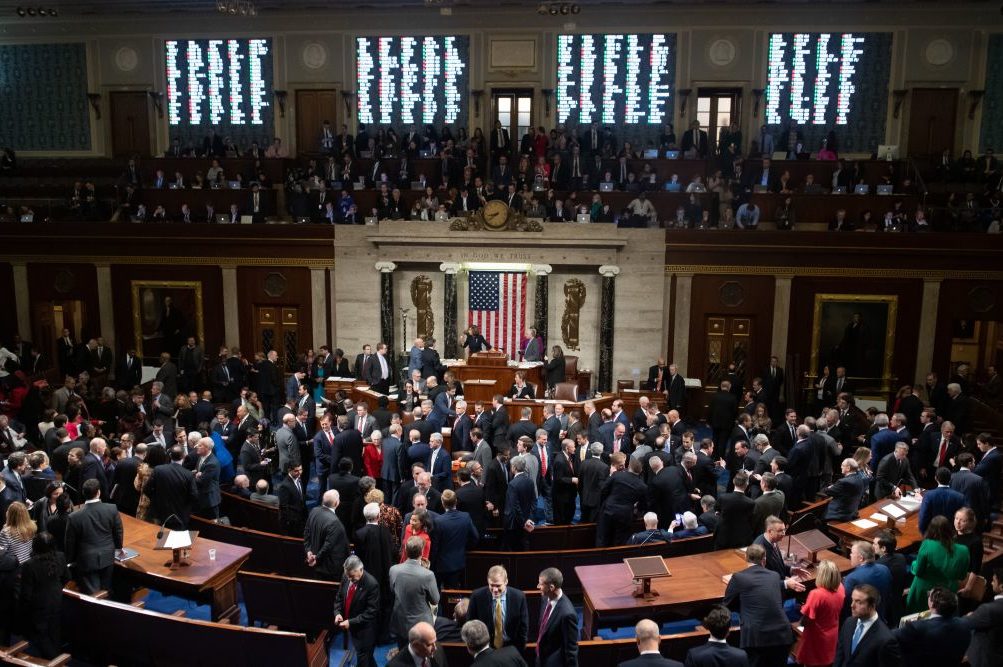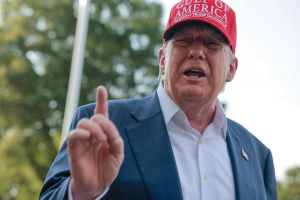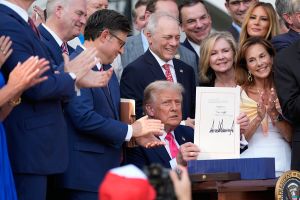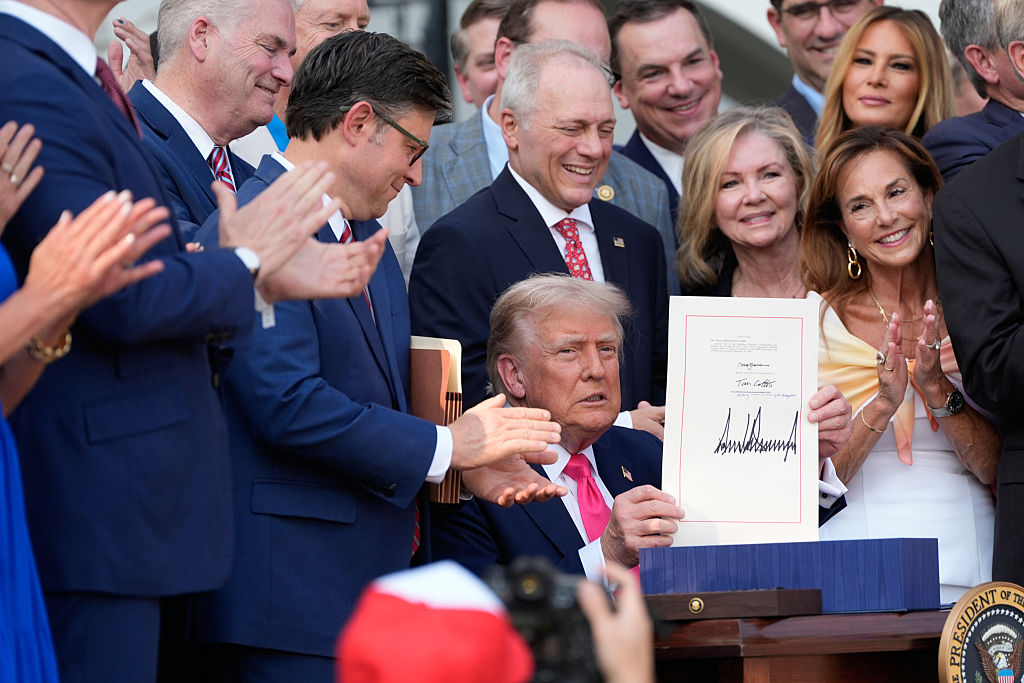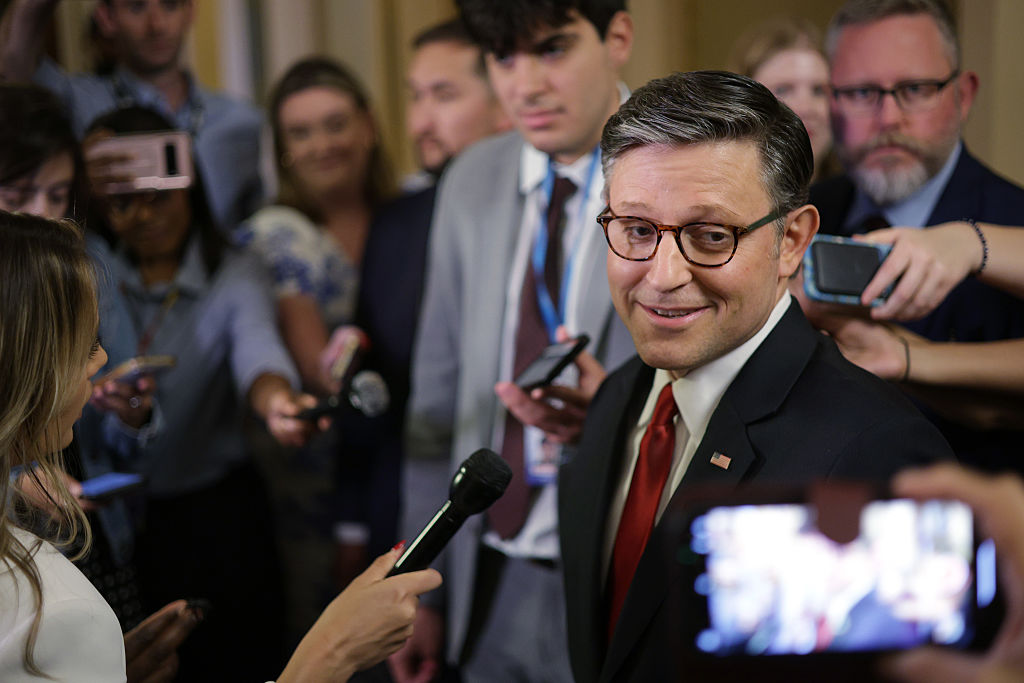Did we just witness an historic event, the impeachment of only the third president in the entire history of the Republic?
Or was this a case of accusatio interrupta: impeachment interrupted by an untimely withdrawal from Nancy Pelosi?
The speaker of the House, unhappy at Senate Majority Leader Mitch McConnell’s obvious contempt for the House proceedings, has suggested that she might not file the charges with the Senate.
In which case, the Senate could not hold a trial.
In which case, Donald Trump could neither be exonerated nor convicted.
In which case, he would not have been impeached by the House, but only ‘impeached’.
It’s amazing what semantic potency can reside in a pair of quotation marks.
Consider the difference between ‘fresh fish’ and ‘”fresh” fish’.
It is the same with the quasi-legal, wholly political process known as impeachment. It is one thing to have been impeached. It is quite another to have been ‘impeached’.
From one follows a Senate trial, cross examination of witnesses, the presentation of evidence, an opportunity for the accused to defend himself.
Ultimately, there follows a vote. If 67 senators vote to convict, the president will then be removed from office.
From the other follows — grandstanding by Democratic apparatchiks and blather by their media enablers.
What a let-down. The ‘greatest deliberative body in the world’, etc. etc., and what do we get? Theater, and bad theater at that. Something Pinteresque: all angst, no denouement. Partruient montes, as Horace put it, nascetur ridiculus mus: ‘the mountains go into labor and give birth to a ridiculous mouse’.
Accusatio interrupta: embarrassing and unsatisfactory all around.
I understand that there is some legal dispute about the significance of Nancy Pelosi’s non-consummation of the process she abetted. Some scholars say that, regardless, Donald Trump is still impeached.
The weight of the opinion, however, is on the other side. A good summary was provided by Harvard law professor, Noah Feldman, one of the Democrats’ chief witnesses for the pro-impeachment case.
‘Impeachment as contemplated by the Constitution,’ Feldman wrote after Nancy made her, ah, withering suggestion, ‘does not consist merely of the vote by the House, but of the process of sending the articles to the Senate for trial. Both parts are necessary to make an impeachment under the Constitution: The House must actually send the articles and send managers to the Senate to prosecute the impeachment’ (my emphasis).
‘If the House never sends the articles,’ Feldman concludes, ‘then Trump could say with strong justification that he was never actually impeached.’
I think this is true, though whether it will come to that remains up in the air. The outcome will depend on what shenanigans the House, as always enabled by their flacks in the media, can force upon the Senate. So far it looks as though Mitch McConnell will brook no nonsense. If that is right, then the dudgeon will be high. Expect the editorial board of the New York Times, fresh off their 1619 cruise, to go full Jeremiah, ‘threats to the rule of the law’, ‘sanctity of our Constitution’, ‘Republicans trampling on precedent’,’undermining our democracy’, etc., etc.
Air-sickness bags will not be provided, so bring your own.
But maybe Nancy will just close her eyes and go through with it after all. As I say, it will all depend on what she thinks she can get out of it. It may be taken as read, I submit, that the baseless articles of impeachment will be hastily crushed by the Republican-controlled Senate, where the charges will not even get a majority, to say nothing of the two-thirds majority necessary to remove a president.
Which leaves us — where?
Many commentators, myself included, have warned that the House was playing a dangerous game by taking the box marked ‘impeachment’ down from the shelf and beginning to bat those balls around when there were no plausible grounds — none — for playing the game to begin with. Impeachment — again, as many commentators, myself included, have pointed out — was intended by the Founders to be a remedy of last resort, an in-case-of-fire-break-glass option when every other recourse had failed.
As recently as this March, Nancy Pelosi had insisted that impeachment had to be a bipartisan decision, only employed to address the most serious crimes. In endorsing the House charade, she shelved that scruple along with all her other ones. The result, as Andy McCarthy and others have pointed out, will be to make impeachment much more common. The price of ‘trivializing’ impeachment, as the House has just done, will likely be to make it the ‘new normal’.
Indeed, the legal scholar Jonathan Turley, a prominent critic of the president, but one who has not therefore tainted his reason, pointed out that by the standards employed against Donald Trump, every living president could have been impeached. Turley was particularly troubled by the charge that the president was guilty of obstructing Congress. Why? Because all the president did was go to court to challenge House demands for certain evidence. The House, Turley noted, ‘set an abbreviated period for investigation, arguably the shortest investigation of any presidential impeachment’:
‘And then they said if you don’t turn over the evidence during that period, you’re obstructing Congress. Well, President Trump went to court to challenge the necessity of handing over that material. Both Bill Clinton and Richard Nixon were allowed to go all the way to the Supreme Court — they ultimately lost, and Nixon resigned soon after. My concern is that this really does seem like you are making an appeal to the court into a high crime or a misdemeanor (my emphasis).’
I think there are two takeaways from this sad affair. One concerns the future place of impeachment in our system of government. I think that Andy McCarthy is right in suggesting that the ultimate sanction of impeachment has more and more been been routinely threatened because the usual checks and balances have been more or less neutered by the growing power of the so-called administrative state. ‘The problem,’ McCarthy writes, is that:
‘after a century of progressive governance…these checks do not work anymore. The federal government and its administrative state have grown monstrously big. Federal money is now as much tied to social welfare as to traditional government functions. Budgeting is slap-dash and dysfunctional. To threaten to deny funds or leave agencies leaderless is to be seen, not as reining in executive excess, but as heartlessly harming this or that interest group. Lawmakers would rather run up tens of trillions in debt than be portrayed that way.’
A lot more could be said about the growth of administrative power, which is essentially executive power, in the face of the paralysis or abdication of responsibility of Congress to fulfill its core responsibilities.
But in the context of our present Trump-centric drama, I suspect that the chief issue is a deeper, structural deformation. I mean the gradual transformation of our government from a vigorous two-party system into a one-and-a-half party system. I’ve written about this before. The idea is not mine but something I crib from conversations with the commentator James Piereson of the William E. Simon Foundation.
The bottom line is that, for many decades now, no matter which party has been in office, the real center of power has resided in the regime party, the party that government itself evolved into. Although plenty of Republicans have sat around this table, happy to engorge themselves on the attendant spoils, the regime party has always been the Democratic party. They encouraged an agenda of dependency that they could simultaneously cater to, exploit, and manage—an agenda that resulted not only in that bloated administrative apparatus that is staffed primarily by Democrats but also a sort of professional underclass of clients of this apparatus. Until the election of Donald Trump, the fealty of this underclass was reliably Democratic. Now there are cracks in the edifice, a terrifying prospect for their managers.
This is the thing to keep in mind. Donald Trump represents an existential threat to this status quo. Which is why he had to be stopped. On January 20, 2017, 19 minutes after Trump was inaugurated, the Washington Post announced in a headline ‘The campaign to impeach President Trump has begun.’ Indeed, there were calls for Trump’s impeachment even before he was sworn in. Rep. Al Green put it with admirable clarity when he said, back in 2017 (reiterating the sentiment in 2018) that ‘I am concerned that if we do not impeach this president, then he will get reelected.’
Trump’s real crime, in other words, was having been elected in the first place.
The point is that Donald Trump had to be impeached not because of anything he had done or had failed to do but because of who he was, what he represented: an existential threat to string-pullers of our one-and-a-half-party system. That is why the Democrats can ride roughshod over the rule of law, to say nothing of precedent and tradition, ruining who knows how many lives, tying up the business of government with preposterous special counsel investigations, House hearings, and the like, while the Republicans mostly vibrate in impotent fury and they emerge from the turmoil scot-free.
Again, there are some signs of fissures in this decades-on Democratic dispensation. The pugilistic response of the president himself is one such sign (‘Cet animal est très méchant: quand on l’attaque il se défend‘ — ‘This animal is very mean: it defends itself when attacked’). Another sign of change is the stalwartness of Mitch McConnell and the doggedness of US Attorney John Durham and his boss, Attorney General William Barr. My own guess is that we’ll know real progress has been made when — or rather if — a raft of indictments are handed down in the business of the deep-state effort to take down the Trump campaign and then his presidency.
It might never happen. It would, as far as I know, be the first time that the regime party was truly held to account. I am assured by many smart people that this will not happen. They may well be right. If they are, then Trump’s presidency — even if he manages a second term (which at this point I think likely) — will count mostly as an anomaly, a strange challenge to the nomenklatura that they tried to prevent, and then to destroy, but ended up simply waiting out.
This article was originally published on American Greatness.



